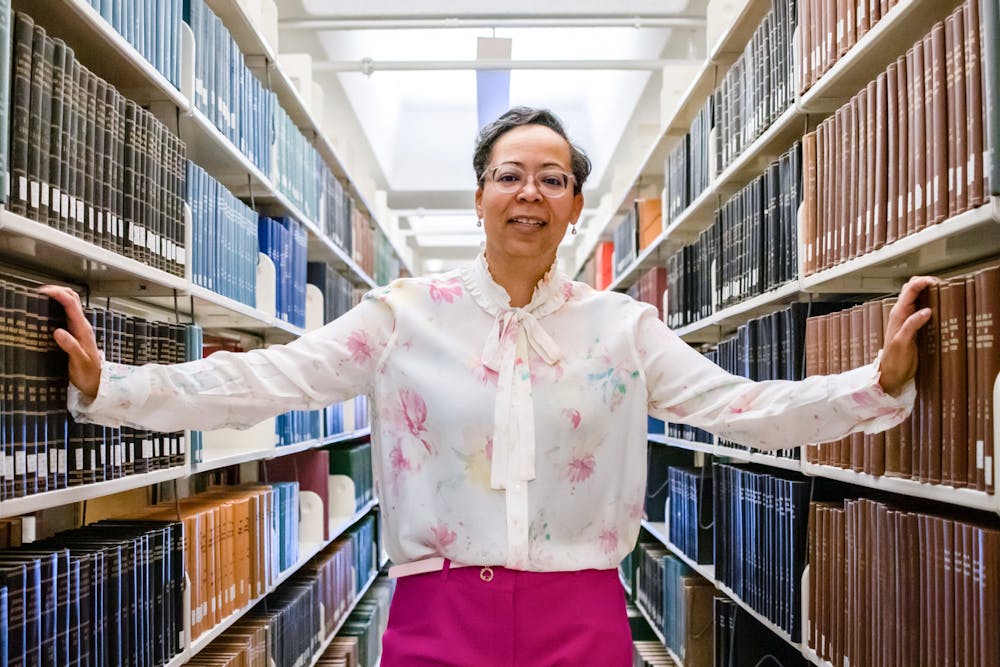When the search for a new University librarian was underway years ago, William Ferris, a retired UNC professor of history and folklore, made it a point to attend every candidate presentation.
Ferris, a longtime supporter of University Libraries who has served on the Friends of the Library Board of Directors, was particularly impressed by Westbrooks’ presentation — so much so that he personally appealed to then-dean of the College of Arts and Sciences Kevin Guskiewicz, who was the chairperson of the search committee.
“I just felt she would be a dream appointment,” Ferris said. “And she has more than excelled my expectations for her.”
Westbrooks’ presentation included a comprehensive and compassionate plan for the library system, and an understanding of the future of technology and the importance of the field of the American South, Ferris said.
During her time at UNC, Westbrooks has focused on moving library resources toward initiatives that promote DEI and address the erasure of underrepresented communities from archives and other materials.
“This deep commitment and this understanding of what it means to be equitable — I get it,” she said. “Not because I was born with the skills, but I have done the research, I have a lived experience, and I've talked to people and I know what it means to suffer the indignity of going places and not being treated like you belong.”
‘She’s not replaceable’
After graduating from the University of Pittsburgh, Westbrooks gained experience at several different libraries, including as a the head of metadata services at Cornell University, associate dean of libraries at the University of Nebraska-Lincoln and associate university librarian for research at the University of Michigan.
During her five years at UNC, she and her team have launched projects that aim to document racial history at the University and in North Carolina.
Associate history professor William Sturkey, who has worked closely with Westbrooks on some of these projects, said she is the most important leader on campus for pushing UNC to deal with its history of race.
“We’re never going to have somebody again like Elaine Westbrooks,” Sturkey said. “She’s not replaceable, largely because the work that she’s put in and the contributions that she made at a time of crisis in the University’s history.”
Westbrooks and Sturkey have worked together on University Libraries’ Reckoning Initiative, which was a call to action to interrogate systems that perpetuate inequity following the murder of George Floyd in 2020, Westbrooks said.
To get the day's news and headlines in your inbox each morning, sign up for our email newsletters.
Launched in May 2021, the initiative is a layered approach to advancing DEI and antiracism work within the library system. The initiative aims to consider questions such as how the system does its hiring and which places it acquires books and collections from.
“It really was a response to what’s happening in our society,” Westbrooks said.
Ultimately, her work comes down to communities, Westbrooks said. She has been involved in the North Carolina Digital Heritage Center, a project that works with historical societies, museums and schools to digitize culture and history, making it accessible online.
The project, which is housed in Wilson Library, has gone to 100 counties in the state. It has recently focused on historically Black schools and communities to preserve yearbooks and newspapers, such as The Carolina Times and The Star of Zion.
“You have to know who you are, where you’ve been,” Westbrooks said. “And that’s why this North Carolina Digital Heritage Center Project is really near and dear to my heart.”
Work like this, she said, demonstrates a commitment to the state and its residents.
'Libraries are the glue'
Her hope for University Libraries moving forward is for it to continue being recognized and acknowledged for its work.
“I’ve felt supported for the five years I’ve been here,” Westbrooks said. “I’ve been given autonomy to do some amazing things.”
But recent years have not come without challenges for University Libraries.
Library buildings were closed at the start of the COVID-19 pandemic, with a phased return to operations as students and faculty came back to campus. University Libraries is also facing significant budget cuts through the next fiscal year.
Through these challenges, Westbrooks said, the work of University Libraries and libraries across the country are important to sustain a healthy democracy.
“I don’t think it’s a stretch to say that democracies are under attack right now,” she said. “Libraries are the glue. We’re a social infrastructure that enables our democracy to thrive.”
This summer, Westbrooks will continue her work at another library system.
She’ll return to Ithaca to be the Carl A. Kroch University Librarian at Cornell. It’s an opportunity to start over at another place she loves, Westbrooks said.
And she knows the team she’s leaving behind will continue to be the “intellectual home” of the University, continue to be part of the glue the world needs.
“It’s very bittersweet, having to leave,” Westbrooks said. “And there’s so many things that have been planted, and I’m not going to be able to see them bloom.”
@praveenavsoma
university@dailytarheel.com I elevate@dailytarheel.com




